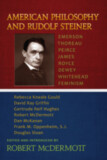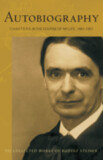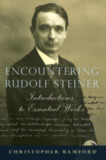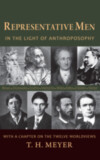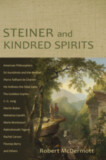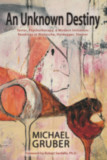Friedrich Nietzsche
Fighter for Freedom
Rudolf Steiner
Foreword by Bernard J. Garber
Introduction by Paul Marshall Allen
Translated by Margaret Ingram deRis
Foreword by Bernard J. Garber
Introduction by Paul Marshall Allen
Translated by Margaret Ingram deRis
Paperback
October 2024
9781621483380
More details
- Publisher
SteinerBooks - Published
8th October - ISBN 9781621483380
- Language English
- Pages 228 pp.
- Size 5.5" x 8.5"
$24.95
Written in 1889 (CW 5)
Immediately upon reading Nietzsche’s Beyond Good and Evil in 1889, Rudolf Steiner recognized a kindred spirit—a courageous fighter for the freedom of the human individuality who waged a fierce but unconscious battle against the unspiritual views of the age.Rudolf Steiner met Nietzsche once in Naumburg in 1895. By this time, Nietzsche’s mental state had already deteriorated. In his autobiography, Steiner recounts his intensely affecting encounter with Nietzsche, facilitated by Nietzsche’s sister, Frau Foerster-Nietzsche. There, Steiner describes the profound impact of being led into Nietzsche’s room and observing him lying on his bed in a state Steiner called “spirit-night.” In a radiant vision, Steiner saw Nietzsche’s ill-starred destiny, his soul yearning for the spiritual enlightenment it sought but could not fully grasp. This moment transformed Steiner’s previous impression of Nietzsche into an encompassing spiritual understanding.
Soon afterward, Frau Foerster-Nietzsche asked Steiner to organize the Nietzsche Library at the Archive in Naumberg, and for several weeks Steiner was able to immerse himself in the books Nietzsche had read. Reflecting on Nietzsche’s intense, devoted, and wide-ranging studies, Steiner especially pointed to a heavily annotated volume by Ralph Waldo Emerson.
Rudolf Steiner’s meeting with Nietzsche and his experience in the Archive immediately preceded his writing this book. They are the heart of Friedrich Nietzsche: Fighter for Freedom and inform the mood in which it was written.
Friedrich Nietzsche: Fighter for Freedom is an intimate and unique portrait of Friedrich Nietzsche himself and a true characterization of his eternal creative goal, the “superman.” Through authentic spiritual research, Rudolf Steiner illuminates for us Nietzsche’s enduring legacy and provides a deep, spiritual understanding of his life and work.This book is a translation from German of Friedrich Nietzsche, ein Kämpfer gegen seine Zeit (GA 5).
C O N T E N T S:
Foreword to the 1985 Edition
Introduction: Friedrich Nietzsche and Rudolf Steiner
1 Friedrich Nietzsche, a Fighter against His Time
2. The Psychology of Friedrich Nietzsche as a Psychopathological Problem
3. Friedrich Nietzsche’s Personality and Psychotherapy
4. The Personality of Friedrich Nietzsche, a Memorial Address
Index
Rudolf Steiner
Rudolf Steiner (b. Rudolf Joseph Lorenz Steiner, 1861–1925) was born in the small village of Kraljevec, Austro-Hungarian Empire (now in Croatia), where he grew up. As a young man, he lived in Weimar and Berlin, where he became a well-published scientific, literary, and philosophical scholar, known especially for his work with Goethe’s scientific writings. Steiner termed his spiritual philosophy anthroposophy, meaning “wisdom of the human being.” As an exceptionally developed seer, he based his work on direct knowledge and perception of spiritual dimensions. He initiated a modern, universal “spiritual science” that is accessible to anyone willing to exercise clear and unbiased thinking. From his spiritual investigations, Steiner provided suggestions for the renewal of numerous activities, including education (general and for special needs), agriculture, medicine, economics, architecture, science, philosophy, Christianity, and the arts. There are currently thousands of schools, clinics, farms, and initiatives in other fields that involve practical work based on the principles Steiner developed. His many published works feature his research into the spiritual nature of human beings, the evolution of the world and humanity, and methods for personal development. He wrote some thirty books and delivered more than six thousand lectures throughout much of Europe. In 1924, Steiner founded the General Anthroposophical Society, which today has branches around the world.



